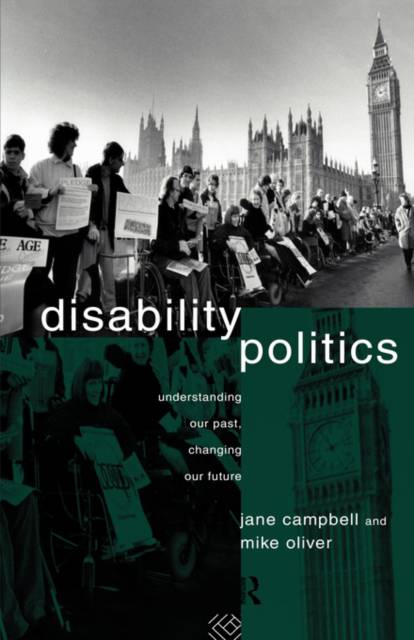
- Afhalen na 1 uur in een winkel met voorraad
- Gratis thuislevering in België vanaf € 30
- Ruim aanbod met 7 miljoen producten
- Afhalen na 1 uur in een winkel met voorraad
- Gratis thuislevering in België vanaf € 30
- Ruim aanbod met 7 miljoen producten
Zoeken
Disability Politics
Understanding Our Past, Changing Our Future
Jane Campbell, Mike Oliver
Hardcover | Engels
€ 351,45
+ 702 punten
Uitvoering
Omschrijving
This powerful book presents a series of perspectives on the process of self-organisation of disabled people which has taken place over the last thirty years. The 1980s saw a transformation in our understanding of the nature of disability, and consequently the kinds of policies and services necessary to ensure the full economic and social integration of disabled people. At the heart of this transformation has been the rise in the number of organisations controlled and run by disabled people themselves. Through a series of interviews with disabled people who have been centrally involved in the rise of the disability movement, the authors present a new collective history which throws light on the politics of the 1980s, and offers insights into future political developments in the 1990s and on into the twenty-first century.
Specificaties
Betrokkenen
- Auteur(s):
- Uitgeverij:
Inhoud
- Aantal bladzijden:
- 240
- Taal:
- Engels
Eigenschappen
- Productcode (EAN):
- 9780415079983
- Verschijningsdatum:
- 11/07/1996
- Uitvoering:
- Hardcover
- Formaat:
- Genaaid
- Afmetingen:
- 138 mm x 229 mm
- Gewicht:
- 458 g

Alleen bij Standaard Boekhandel
+ 702 punten op je klantenkaart van Standaard Boekhandel
Beoordelingen
We publiceren alleen reviews die voldoen aan de voorwaarden voor reviews. Bekijk onze voorwaarden voor reviews.











